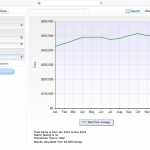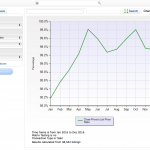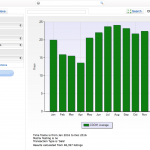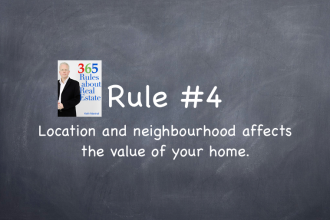It’s a seller’s market
Last year, Waterloo Region’s very own City of Cambridge was reported for a time to be Canada’s tightest local housing market. It’s a seller’s market. Guelph was second tightest and Kitchener-Waterloo fifth. Oakville-Milton and Hamilton-Burlington were also in the top ten. See a trend here?
What is a seller’s market?
A seller’s market is defined as an economic situation in which goods are scarce and sellers can keep prices high. In real estate, a seller’s market is one where there are more buyers than there are homes for sale. Since demand is high and supply is low, price appreciation occurs.
Absorption rate
A market’s absorption rate is one way to figure out whether a certain area is behaving for the benefit of the buyer or the seller. Absorption rate is the number of months it would take to sell the currently listed homes in the market. The absorption rate is calculated by dividing the number of homes sold during a period by the number of homes for sale at the end of the period. An absorption rate of 20% or more indicates a seller’s market since homes are selling fast and the number of months supply is low.
Calculation
I looked at the Kitchener Waterloo home sales for the past 180 days and found that 3327 homes sold. That is an average of 555/month.
Then I looked up how many homes were currently for sale = 476.
476/555 = .85765 or 86%
Put another way, if no new houses were listed for sale we would sell all of our current inventory in 26 days.
30 x .86= 25.8
That is a serious seller’s market. Shorter absorption rates mean that prices will climb.
Sales-to-Listing ratio
Another way to calculate a seller’s market is a straight Sales-to-Listing ratio. In any given month or period, the number of sales is compared to the number of new listings taken. If the result is 55% or greater – there are 55 sales for every 100 listings – it is considered a seller’s market.
Unfortunately I could not find the right data to do this calculation.
But I did find these:
How to buy in a seller’s market.
Strategy changes in a seller’s market. As a buyer you have far less control than you would have in a balanced market (or in a buyer’s market). Here is what you have to do to win.
1) Make your best offer. This is no time to dither. You have to strike with absolute clarity.
2) Be quick. Make sure you have all of your ducks in a row so you can take that house off the street quickly. That means being pre-approved for a mortgage and having a home inspector on speed-dial if you think you’re going to need an inspection.
3) Work with a buyer’s agent. This will not only speed things up but also give you access to the knowledge you need to make smart decisions.
4) Be mentally prepared. Be prepared to get into a bidding war. Be prepared to lose a few battles as you learn how to win.
5) Learn how to win. Buying a home in a seller’s market is time consuming and frustrating.
How to win this year
Last year, time and time again, me and my clients would say, “I can’t believe it sold for that”. With prices rising throughout the year, the problem was that we were still doing things in the same kinds of ways: Questions like: “How many days on the market?”, and “How many offers are there?” are irrelevant in this market. List price is irrelevant as well. Looking up comparable recent neighbourhood sales of similar homes proves also to be a losing strategy too.
There were also some old rules still floating around like: “add $5000 over asking price for every offer” or “add 1% of asking price for every offer”. Clearly those rules are not going to work anymore.
In short, how we used to determine a reasonable offer price cannot work in such a competitive market.
So, what to do? –> Predictive analysis
Since late last year, I have been tracking the homes that my clients are interested in. Not only homes that we visit, but also homes that they like or make notes on through the portal or email me with questions about. It is a lot of work, but for most every home I run it through three filters and make my best estimate of what it will sell for.
I’m not always right, but I’m getting righter with more and more data.
I’m really paying attention to the comparative value of homes, what different neighbourhoods, price ranges, ages and styles of homes (i.e. freehold towns vs. condo towns) are selling for. I’m watching, doing the math, learning and winning more.
Little big data
What is interesting is that it seems to be working. I call it little big data.
I have long thought that real estate agents are a good reflection of their clients. Put another way, clients choose to work with certain types of realtors and as such there is a natural filter put on the data – the clients filter out the best houses and then the analysis reflects the predicted selling price.
These are the new rules for the new game.
Stay informed link








